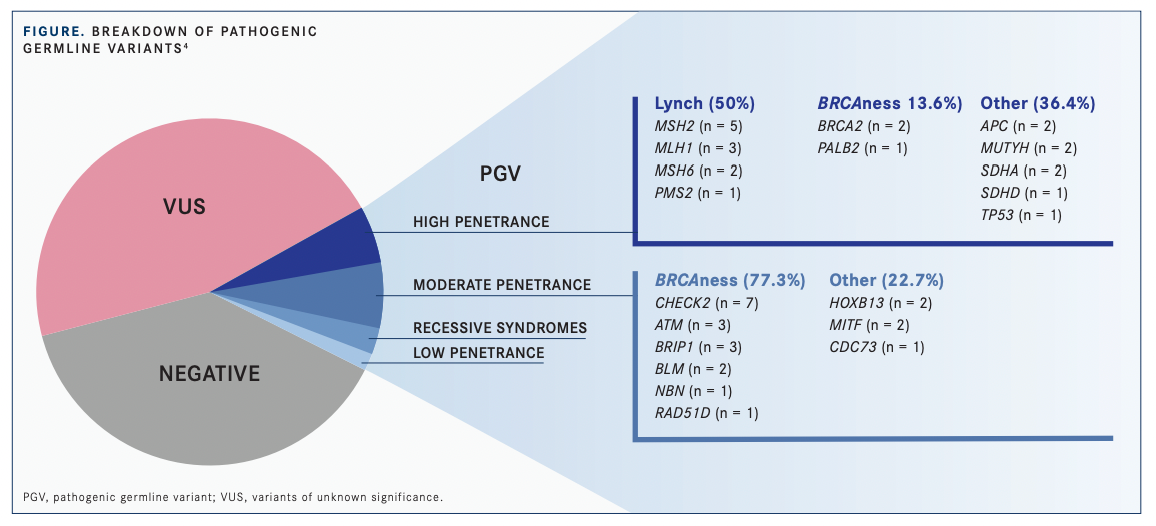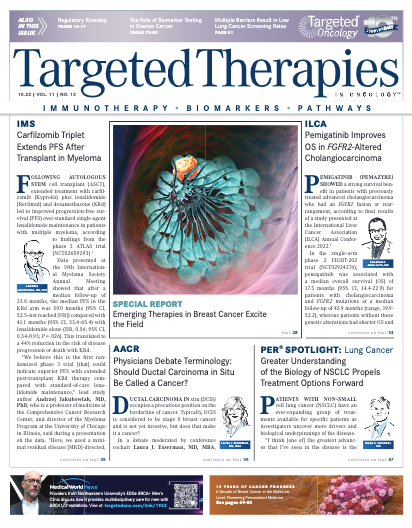NCCN Update Recommends Multigene Panel Testing for All Patients Who Receive Colorectal Cancer Diagnoses
Updated guidelines recommend all patients with colorectal cancer, regardless of age or family history, should receive multigene panel testing.

A recent update to the National Comprehensive Cancer Network (NCCN) guidelines on colorectal cancer (CRC) comes after evidence that actionable variants have been missed under previous testing criteria. The updated guidelines recommend all patients, regardless of age or family history, should receive multigene panel testing (MGPT).1,2
According to previous guideline recommendations, patients 50 years and older who receive diagnoses of CRC would be offered MGPT. Because CRC is the fourth most frequently diagnosed cancer in the United States and third most common worldwide, panel members believed the change in the guidelines could affect millions of individuals.2
“The NCCN panel currently recommends that all patients with CRC [who receive diagnoses before] age 50 [years] have MGPT, and that MGPT be considered also for patients 50 and older with CRC,” said Samir Gupta, MD, MSCS, AGAF, professor, Division of Gastroenterology, Moores Cancer Center at UC San Diego Health; and chair, NCCN Clinical Practice Guidelines in Oncology (NCCN Guidelines) Panel for Genetic/Familial High-Risk Assessment: Colorectal.
“These recommendations could evolve in the future as more evidence emerges about the yield and benefi ts of [MGPT] for all patients with cancer.” When selecting MGPT for CRC, the panel should include, at minimum, the following risk-associated genes: APC, MUTYH, MLH1, MSH2, MSH6, PMS2, EPCAM, BMPR1A, SMAD4, PTEN, and STK11. Selection of a panel that includes genes beyond this minimal set should be based on personal and family history of cancer, as well as patient and provider preference.1
“Multigene testing looks for evidence of a pathogenic variant (mutation) in a cancer risk gene. Most multigene panels contain between 15 and 100 different cancer risk genes. The list of genes tested may include both genes associated with increased CRC risk and genes associated with other cancers such as breast cancer, depending on the multigene panel selected,” Gupta said.
Evolving evidence was found that with the previous recommendations for screening patients, patients with pathogenic germline variants (PGVs) and other familial risks were missed.
A prospective multicenter study (INTERCEPT) of guideline-directed vs universal genetic testing conducted on patients with solid tumors receiving treatment at Mayo Clinic cancer centers showed that the universal approach to MGPT identified more heritable variants than guideline-directed targeted genetic testing.3
The study included 2984 patients, with PGVs identified in 397 (13.3%), with moderate-penetrance and high-penetrance cancer-susceptibility genes found in 282 patients. Variants of uncertain significance (VUS) were identified in 1415 patients (47.4%). Among 372 patients with CRC, 15.3% had PGVs.
Clinically actionable findings that would not otherwise have been identified with guideline-based testing were observed in 192 patients (6.4%), including in 28.2% of patients with high-penetrance PGVs. These genes tended to have published recommendations for a targeted treatment, suggested surgery, or enrollment in a clinical trial.
Identifying PGVs in CRC

Supporting data for the updated guidelines showed that about 1 in 6 patients with CRC had inherited gene mutations that could increase their risk of cancer.2 A multisite study taking place between April 1, 2018, and March 31, 2020, aimed to determine the prevalence of PGVs in patients with CRC using a universal testing approach, association with clinical outcomes, and the uptake of family variant testing. This study looked at a pool of 361 unselected patients with CRC. Universal germline genetic testing found that approximately 1 in 6 patients with CRC (15.5%) harbor a positive PGV, of which more than 50% would not have been detected using standard practice guidelines or a guideline-specific gene panel. No differences in disease-specific outcomes were observed in this study among patients with or without a PGV. Nearly 10% of patients had modifi cations in their treatment based on the findings.4
Of the 361 patients undergoing germline analysis, 56 patients (15.5%) harbored 62 pathogenic/likely pathogenic germline variants, of whom 5 patients had more than 1 PGV detected. PGVs were stratified into those with high (n = 21), moderate (n = 21), or low (n = 7) penetrance, and 7 were carriers of recessive alleles (FIGURE). The most common PGVs were found in CHEK2 (1.9%), MSH2 (1.4%), and MUTYH (monoallelic; 1.4%). A molecular diagnosis of Lynch syndrome was confi rmed in 11 patients (3.1%) due to a PGV in MSH2, MLH1, MSH6, and/or PMS2, and 23 patients (6.4%) had a mutation in a gene associated with homologous recombination deficiency (ATM, BAP1, BARD1, BLM, BRCA1, BRCA2, BRIP1, CHEK2, NBN, PALB2, RAD50, RAD51C, RAD51D, and WRN). More than half (54%) of Lynch syndrome cases were observed in patients with right-sided colon cancer.
Patients with PGVs tended to have no history of smoking, diabetes, or hypertension, and a lower body mass index (< 30). The rate of PGVs was higher in patients with rectal cancer than those with colon cancer (P = .008). The rate of PGVs in those under age 50 years was 21.8% vs 12.2% in those 50 years or older (P = .059). VUS were found in 166 patients (46%). The PGV rate by stage of cancer was 10.5% in stage I, 23.6% in stage II, 15.2% in stage III, and 12.3% in stage IV, and was not statistically different (P = .168). Those with a family history of CRC had a high rate of PGVs (31%).
Nearly 15% of patients who had a PGV had no family history of CRC. Eighteen percent of the recruited population was of non-White race or ethnicity and the prevalence of PGVs was 12.3% and VUS were 55.4%. The majority of PGVs were missense mutations (67%), followed by deletion (24.2%), duplication (6.5%), and insertion (1.6%).
Thirty-four cases had incremental clinically actionable findings that would not have been detected by phenotype or family history–based testing criteria using the 2018 NCCN guidelines or were outside of the genes recommended on a 20-gene panel of CRC-associated genes. This represents 9.4% of the 361 cases overall and 60.7% of the 56 patients with PGV. Of the 34 patients with incremental findings, 8 (23.5%), 15 (44.1%), 5 (14.7%), and 6 (17.6%) patients carried high-penetrance, moderate-penetrance, or low-penetrance variants, and recessive alleles, respectively. Incremental mutations were found more often in patients with CRC diagnosed at an older age (≥ 50 vs < 50 y; P < .0017). Use of the 2020 NCCN guidelines resulted in the same 34 patients with incremental findings.
Had the study stuck strictly to the previous guidelines, participants within the under-50 group without family history may have been missed altogether. This also goes for patients without full knowledge of their own family history.
“The NCCN guidelines recommend that if a patient with CRC has a multigene test and is found to have a pathogenic variant (mutation) that increases the risk for cancer and might have explained why the patient developed cancer, that their relatives should be considered for genetic testing,” Gupta said in an interview with Targeted Therapies in Oncology™.
When asked how physicians could approach this topic with family members of patients not under their care, Gupta continued, “The main strategies for reaching out to family members include…working with/through the patient to encourage their family members to seek genetic counseling or testing; [and] providing the patient with a ‘family letter’ that explains the fi nding and provides information on next best steps. There are many examples of family letters available, and all genetic counselors and some of the genetic testing companies have examples that can be used.”
The utility of germline testing has been a subject of study as well, not just for CRC but also for risks of Lynch syndrome, endometrial cancer (EC), and many others. A multicenter, prospective study conducted in California between July 2014 and November 2016 looked at a group of 2000 participants who met testing guidelines across 3 cancer genetics clinics. The purpose was to see the results of using 25-gene or 28-gene MGPT for hereditary cancer risk assessment with appropriate genetic counseling and demonstrate its capacity to enhance the diagnostic yield of genetic testing without discernible harm to patients.5
Most patients were female (81%) and 73% had a personal history of cancer. Out of 2000 participants, 242 (12%) were found to have at least one pathogenic variant and 689 (34%) carried 1 or more VUS. Seventy-six patients (31% of PGV carriers) had a germline mutation in BRCA1 and/or BRCA2, and 39 (16%) had a pathogenic variant in a mismatch repair gene, conferring a diagnosis of Lynch syndrome. Forty-three patients (18%) had a monoallelic (n = 41) or biallelic (n = 2) pathogenic MUTYH variant. Nineteen patients (8%) had pathogenic variants in APC, with 16 of them having the founder mutation APC I1307K, and 6 had pathogenic variants in TP53 (2%). Other genes with detected pathogenic variants included CHEK2 (n = 17; 7%), ATM (n = 16; 7%), PALB2 (n = 9; 4%), BRIP1 (n = 5; 2%), RAD51C (n = 4; 2%), BARD1 (n = 2; 1%), NBN (n = 2; 1%), CDH1 (n = 1; 0.4%), and CDKN2A (n = 1; 0.4%). Among patients without pathogenic variants, 689 (34%) had at least 1 VUS, with up to 4 per patient.
A similar prospective analysis was conducted in patients with EC, and the investigators determined that knowing the germline status at the time of diagnosis allows for further definition of germline/phenotype associations and can help to determine a genetic syndrome for cancer prevention. As such, Levine et al recommended that up-front MGPT be adopted into routine clinical care in EC because it provides clinically impactful information.6
Access and What to Do With the Results
Knowing the results of MGPT is one step toward a whole picture. “Multigene panel tests done for evaluation for a cancer risk gene are not designed to predict CRC. They are intended to identify individuals who are at increased risk. Based on the pathogenic variant, or mutation, in a cancer risk gene, we can estimate the lifetime chances of developing CRC. These lifetime risk estimates are what guide recommendations for how patients should be managed; for example, whether they need to start colon cancer screening at a young age or have it more frequently,” commented Gupta.
Do these screening tests narrow down treatment options for patients diagnosed with CRC? “Based on the most recent panel review, we concluded that MGPT panel results alone would not narrow or refi ne treatment options for patients with CRC. This is different from what is true right now for some other cancers and could change [soon] based on evolving evidence,” Gupta explained. “Multigene panel testing, depending on the cancer risk gene identified, could have the opportunity to provide some patient screening and surveillance options that could not only help detect cancers early but also prevent cancers.”
Some organizations worry that MGPT results, without proper interpretation, could lead to overscreening and unnecessary treatment. The NCCN believes that the best management of any patient with cancer is through a clinical trial. Participation in clinical trials is especially encouraged.1 “Every patient should work with their doctor to ask about whether a clinical trial may be right for them. Clinical trials may be a great option for early or late treatment, depending on the trial, patient preferences, and the recommendations their doctors give them,” said Gupta.
Clinical trials may also be a more accessible way for patients to offset cost of treatments, though there are no comprehensive studies supporting this. A study was conducted with (mostly) genetic counselors looking at 4 areas: factors affecting laboratory choice and test ordering; experience with insurers; patient out-of-pocket costs; and alternate payment mechanisms for noncovered tests.7
A study involving 11 clinics in California and North Carolina looked to identify financial challenges associated with patients’ out-ofpocket costs and difficulty in having tests covered by insurance. Although respondents felt that laboratory payment assistance programs and expansion of coverage by many insurers facilitated testing, some coverage challenges remained. Medicare’s coverage policies, which largely do not cover testing for patients without a cancer history, and constant changes in coverage policies by commercial insurers that are not always in line with NCCN guidelines, were significant concerns among the respondents. This could make family cascade testing less accessible for insurance reimbursement if the family member has no previous history of cancer or if they live outside the country. Respondents reported few challenges overall, but the biggest barriers identified involved coverage for genetic counseling.
“The landscape for coverage is evolving rapidly. Patients and doctors should check with their insurance companies to see if testing is covered. There are some companies that offer genetic testing at a maximum cost of $250 out of pocket,” said Gupta.
As more clinical trials progress and screening technology advances, we could see updates to guidelines more frequently. “Every year, NCCN guidelines panel members look for new studies that could inform updates to the NCCN guidelines, because there are innumerable studies in progress that could impact how we assess and manage risk for [individuals] at risk for CRC based on hereditary factors,” Gupta said.
Gupta discussed ongoing areas of unmet needs with genetic testing in CRC. “Although we are able to identify a number of cancer risk genes that appear to increase risk for CRC, we do not have great data on lifetime risk among carriers. We need prospective or retrospective long-term data from large cohorts who have had genetic testing to be able to make such estimates. The second area is continuing to study the best strategies for early detection and prevention of cancers in [individuals] who have increased risk.”
REFERENCES
1. NCCN. Clinical Practice Guidelines in Oncology. Genetic/familial high-risk assessment: colorectal, version 1.2022. Accessed September 6, 2022. https://bit.ly/2EVRHlm
2. New NCCN colorectal cancer guidelines recommend genetic testing for all diagnosed patients. News release. Invitae. August 8, 2022. Accessed September 6, 2022. https://bit.ly/3xbhccr
3. Samadder NJ, Riegert-Johnson D, Boardman L, et al. Comparison of universal genetic testing vs guideline-directed targeted testing for patients with hereditary cancer syndrome. JAMA Oncol. 2021;7(2):230- 237. doi:10.1001/jamaoncol.2020.6252
4. Uson PLS Jr, Riegert-Johnson D, Boardman L, et al. Germline cancer susceptibility gene testing in unselected patients with colorectal adenocarcinoma: a multicenter prospective study. Clin Gastroenterol Hepatol. 2022;20(3):e508-e528. doi:10.1016/j.cgh.2021.04.013
5. Idos GE, Kurian AW, Ricker C, et al. Multicenter prospective cohort study of the diagnostic yield and patient experience of multiplex gene panel testing for hereditary cancer risk. JCO Precis Oncol. 2019;3:PO.18.00217. doi:10.1200/PO.18.00217
6. Levine M, Pearlman R, Hampel H, et al. High prevalence of actionable germline variants in unselected endometrial cancer (EC) patients. J Clin Oncol. 2021;39(suppl 15):5577. doi:10.1200/JCO.2021.39.15_suppl.5577
7. Lin GA, Trosman JR, Douglas MP, et al. Infl uence of payer coverage and out-of-pocket costs on ordering of NGS panel tests for hereditary cancer in diverse settings. J Genet Couns. 2022;31(1):130-139. doi:10.1002/jgc4.1459

Survivorship Care Promotes Evidence-Based Approaches for Quality of Life and Beyond
March 21st 2025Frank J. Penedo, PhD, explains the challenges of survivorship care for patients with cancer and how he implements programs to support patients’ emotional, physical, and practical needs.
Read More